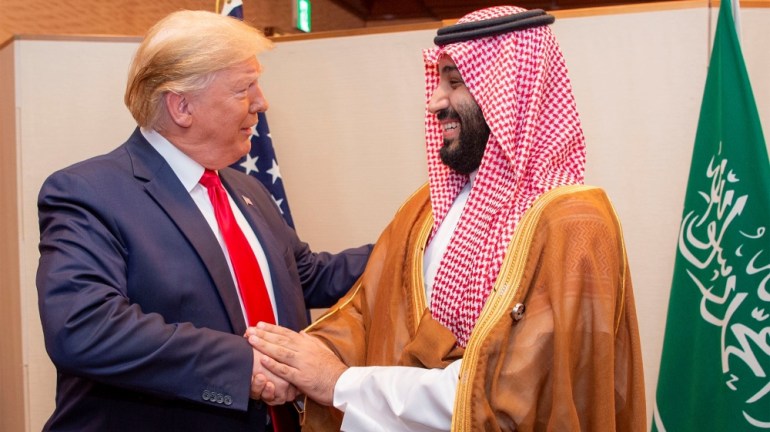US legislators want sanctions on MBS. Will they succeed?
Lawmakers are pushing President Joe Biden to take a harder line against Saudi leader over Jamal Khashoggi’s killing.

Less than two weeks after the release of an unclassified US intelligence report on the 2018 killing of Saudi journalist Jamal Khashoggi, pressure continues to build in Washington for President Joe Biden to hold Saudi Crown Prince Mohammed bin Salman (MBS) accountable.
The widely anticipated report confirmed what many human rights groups, United Nations experts and US lawmakers had long argued: the crown prince approved the operation to “capture or kill” Khashoggi at the Saudi consulate in Istanbul.
Keep reading
list of 3 items‘Hold MBS accountable’: World reacts to US Khashoggi report
US defends not sanctioning MBS for Khashoggi’s murder
But the Biden administration has said it would not directly sanction or impose a travel ban on MBS; instead, it said it plans to “recalibrate” – but not “rupture” – Washington’s relationship with Riyadh, a longtime strategic ally.
That widely criticised decision has prompted legislative efforts by US lawmakers who want to hold MBS, Saudi Arabia’s de facto leader, accountable – though whether those attempts will be successful remains to be seen.
“The movement in Congress is very encouraging,” Raed Jarrar, advocacy director for Democracy for the Arab World Now (DAWN), a US-based group founded by Khashoggi, told Al Jazeera. The organisation is calling for direct sanctions on MBS.
“Momentum has been going on for the last couple of years, pushing for the release of the report, and will continue now to hold those names in the report accountable,” he said.
Raft of legislation
Saudi Arabia rejected the US intelligence report, describing its findings as “negative, false and unacceptable”. “The Kingdom rejects any measure that infringes upon its leadership, sovereignty, and the independence of its judicial system,” the foreign affairs ministry said in a statement.
But in response to the report, the US imposed new travel bans on 76 Saudi nationals, whose names it said would not be released. It also sanctioned Saudi Arabia’s former deputy intelligence chief, Ahmed al-Assiri, who was involved in the operation to kill Khashoggi, and the Rapid Intervention Force, a unit of the Saudi Royal Guard that falls directly under the crown prince’s control.

But human rights observers have said they hope international calls for accountability – as well as the raft of legislation gaining momentum in Congress over the past several days – will spur the Biden administration to change course.
“It’s important for us to remember that every minute Mohammed bin Salman escapes punishment is a moment where the United States interests, human rights and the lives of Saudi dissenters are at risk,” Congresswoman Ilhan Omar, who has introduced a bill in the House of Representatives to impose sanctions on MBS, told US broadcaster NPR on Thursday.
In a previous statement, Omar said her legislation “is not without precedent”. “From Iran to Russia, the United States regularly sanctions foreign leaders who commit destabilising or violent acts. We must treat the Saudi Arabian Crown Prince no differently.”
Representative Adam Schiff and Senator Amy Klobuchar – both Democrats – have also renewed their push to pass legislation introduced in February that would require the US to sanction “a foreign person if they commit a gross violation of human rights against a journalist”.
The bill would also restrict foreign aid to governments in which a “senior official” commits human rights violations against a journalist. Schiff has said US repercussions should extend to “the crown prince himself”.
Every minute Mohammed bin Salman escapes punishment is a moment where U.S. interests, human rights, and the lives of Saudi dissenters are at risk.
Today, I introduced legislation to place sanctions on the Crown Prince for his role in the murder of Jamal Khashoggi. pic.twitter.com/MKBzxotVbO
— Rep. Ilhan Omar (@Ilhan) March 2, 2021
Another bill was introduced on March 1 by Representatives Tom Malinowski, James McGovern, and Andy Kim – all Democrats, as well – that would ban “all parties” named in the US intelligence report from travelling to the US.
Democratic Representative David Trone also put forward a resolution that calls for the US to stop arms transfers to Saudi Arabia and to pull back on nuclear cooperation if Riyadh “continues to evade responsibility” for Khashoggi’s death, commit rights abuses, and kill civilians in Yemen.
While no new legislation has been introduced in the Senate since the report’s release, Senator Bob Menendez, the chair for the Senate Committee on Foreign Relations, has said he hopes the Biden administration’s initial response is “only a first step” and that it will take concrete measures to hold MBS “personally responsible”.
The general response from Congress has so far been “forceful”, said Seth Binder, the advocacy officer at the Project on Middle East Democracy (POMED).
“The number of pieces of legislation, the number of statements that were thrown out there saying this isn’t enough and that no individual should be above the law, that felt strong to me,” Binder told Al Jazeera.
“From my conversations with folks on the Hill, it seems this will be a continued effort,” he said. “This isn’t something that they’re going to let go. They’re going to try to push through these pieces of legislation and send it to the president’s desk.”

Rethinking foreign policy
Congress has played a central role in seeking to hold Saudi Arabia accountable following the death of Khashoggi, particularly as former President Donald Trump continued to maintain close ties with the kingdom and MBS despite the killing.
The US legislature, then composed of a Republican-controlled Senate and a Democratic-controlled House, passed the 2019 defence bill that required the Office of the Director of National Intelligence (ODNI) to release the Khashoggi report, although the Trump administration had blocked its declassification.
That same year, legislation to sanction those responsible for Khashoggi’s killing, including MBS, passed in the House. Similar legislation was approved with bipartisan support by the Senate Committee on Foreign Relations, but languished in the wider chamber.
Speaking to Al Jazeera before the ODNI report’s release, Steven Wright, a professor at Bin Khalifa University in Doha who focuses on US policy in the Gulf, said there has been a “groundswell” of bipartisan, anti-Saudi sentiment in Congress since Khashoggi’s killing.

“The traditional role of foreign policy in the United States is the prerogative of the president,” he said. “However, there have been cases in years gone by where Congress overrules the president and actually starts leading the process in foreign policy.”
If such legislation does end up on Biden’s desk, “it would put him in a very difficult position as to whether to veto”, said William Hartung, director of the arms and security programme at the Center for International Policy, a US-based think tank.
“If those bills gain steam, it might even get the administration to rethink parts of its policy prior to a bill actually passing,” Hartung told Al Jazeera.
“I think [Biden’s response] is morally unacceptable and bad for US interests in the region,” he added. “But I think the administration still has the opportunity to do more.”
Efforts continue
Still, some prominent Democrats have stuck closely to Biden’s messaging after the Khashoggi report, raising questions over whether the party will be as forceful in demanding MBS be punished as it was during the Trump administration.
Democrats currently hold a razor-thin majority in the Senate and a tight majority in the House.
Democratic Senate Majority Leader Chuck Schumer, a vocal critic of Trump’s response to the murder, has been silent on the matter since the intelligence report’s release, while House Speaker Nancy Pelosi echoed calls to “recalibrate” Washington’s relationship with Riyadh and said she supports steps taken by the administration to punish those connected to the operation.
She has not directly addressed sanctions on MBS, but has said the House will introduce legislation to honour Khashoggi’s legacy.
Republicans, for their part, have been less forthright about where they stand than they were under Trump, although House Foreign Affairs Committee ranking member Michael McCaul has said MBS must be held accountable.
Republican Senator Lindsey Graham, a Trump ally, had prominently broken from the former president over Khashoggi’s killing, saying in 2019 MBS was “complicit” and should be “dealt with”. But Graham has been silent on the issue since the report was released.
Nevertheless, DAWN’s Jarrar said he was confident congressional pressure would continue, even if the tone from Democrats is different from during Trump’s term.
“Democrats went very clearly after the Biden administration [in pushing for the report’s release] in a way that is more communicative than they would have been with Trump,” he said.
“Those who demanded the release of the report knew exactly what was in it, because they had previously read the classified report … So demanding the release wasn’t just about the release; it’s about the actionable items that follow.
“We’re going to continue to meet with members of Congress to continue to push for legislative vehicles,” he added, “until we find some form of justice for Jamal Khashoggi.”